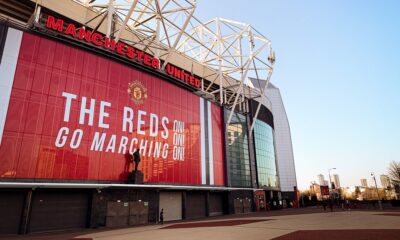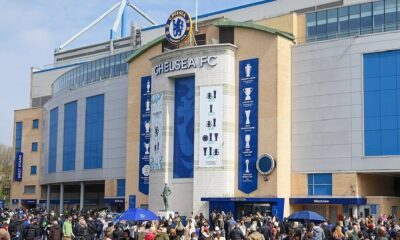Features
The EPL Has More in Common With the NFL Than You Probably Realize
Let’s address a few similarities occurring at the highest professional levels of football and gridiron–the NFL and EPL.
As devotees of England’s top flight, we’re apt to think the term “football” rightly belongs to the beautiful game. Some of us may see American gridiron football as a strange code, perhaps even an imperfect sport.
Sure, there are numerous differences between football and gridiron. Volumes could be filled contrasting the rules and plays that comprise each sport.
But let’s address a few similarities occurring at the highest professional levels of football and gridiron–the NFL and EPL. Both leagues are among the richest and most supported sports federations on Earth. And both extend far beyond their domestic bounds to reach worldwide audiences.
In fact, you may be surprised to learn just how much the NFL and EPL have in common.
Expanding Global Viewerships
In recent years, the NFL and EPL have found themselves on similar trajectories of international influence. Both leagues are more popular globally than ever before.
Much of this borderless success is owed to the NFL and EPL’s concerted campaigns to meet fans where they are. That means conducting matches on foreign soil and airing broadcasts internationally.
The NFL strategically targets the UK and Mexico each season with the International Series, a slate of regular season contests played in London and Mexico City. The series began with a single match between the New York Giants and Miami Dolphins at Wembley Stadium in 2007.
In 2019, the NFL staged four London games–a pair each at Wembley and Tottenham Hotspur Stadium. The league’s Mexico City feature has occurred at Estadio Azteca since 2016.
EPL sides, along with La Liga and other top European flights, often tour the US in the summer months for friendlies held at NFL stadiums. These contests serve as part of the preseason warmup for the annual EPL campaign beginning in August.
Arsenal and Liverpool appeared in US friendlies prior to the 2019-20 EPL season.
The NFL and EPL enjoy reciprocal (although not organized as such) TV coverage on one another’s home turfs.
Sky Sports is the primary broadcaster of NFL games in the UK. The London-based satellite pay company aired over 100 live professional gridiron games throughout the season. Currently, Sky, BBC, and Game Pass, the NFL’s streaming service, are responsible for bringing playoff contests to the UK audience.
The NBC Sports Group owns EPL broadcast rights in the US thanks to a $1 billion, six-year deal inked in 2015. The arrangement gives US fans access to all 380 EPL season matches through one of NBC’s platforms.
In 2019-20, NBC Sports is broadcasting 240 EPL bouts on its NBC, NBCSN, and CNBC networks. The other 140 are available exclusively through the NBC Sports Gold paid subscription service.
Billion Dollar Club Valuations
We said it before, but it bears repeating–the EPL and NFL are big money leagues. That goes for the salaries paid to players, TV broadcast contracts, merchandise sales, and especially the values placed on clubs.
The NFL carries more clubs worth a billion or more, but the EPL list is certainly impressive. The population of the UK is roughly 20 percent that of the sports-crazed US.
The NFL’s Dallas Cowboys are the most valuable club of any sport in the world at $5 billion. The heftiest price associated with an EPL club is Manchester United’s $3.81 billion valuation. That makes Ole Gunnar Solskjær’s squad the sixth-most valuable sports club on the planet and edges out the New England Patriots, the second richest team in the NFL.
Manchester City ($1.41 bn), Liverpool FC ($1.23 bn), and Tottenham ($1.03 bn) round out the EPL clubs worth in excess of a billion dollars. Chelsea’s $984.68 million value nets an honourable mention.
The NFL has a league-wide money edge over the EPL. Every NFL team is worth nearly $2 billion or more. Grid iron’s top tier raked in roughly $16 billion in revenue in 2018 while the EPL earned $7.3 billion that same year.
There’s more parity to be found when we consider those revenue figures averaged out by the number of clubs in each league.
The NFL, with 32 teams, produced a per-team revenue average of $500 million. The 20 clubs of the EPL averaged $365 million per side.
Popularity with Sports Bettors
Not only are the NFL and EPL two of the most globally watched leagues, but they are also two of the most wagered-on by sports bettors.
The stakes placed with bookmakers are staggering.
Each EPL match results in the betting of more than a billion euros. In 2018, $4.76 billion was wagered on the Super Bowl making the NFL’s championship game the richest single sporting event in the world by betting dollars.
There’s even considerable overlap between the NFL and EPL in the kinds of bets placed by punters.
For example, NFL parlay bets are popular in the US. These are bets placed on the outcome of multiple games with a single wager. Each outcome in the parlay must result as the punter predicts in order for the wager to payout. Parlays require researching the odds of multiple contests.
Accumulator bets are similarly popular with EPL punters. Like a parlay, each match included in an accumulator must have the predicted outcome to produce a winning slip.
Comparable Attendance Numbers
NFL and EPL aren’t just for the TV viewer. Both leagues thrive on hefty crowds turning out to watch live matches in person. Stadium capacity is often the limiting factor in attendance at the highest levels of football and gridiron.
League-wide attendance at NFL games in 2018 was 61,700 spectators. That figure fits between the average per-contest home attendance of Manchester United (74,879) and Arsenal (59,897) during the 2018/19 campaign.
Interestingly, all 20 EPL clubs filled their stadiums to at least 90 percent capacity on average for all home contests a season ago. The same can’t be said for the NFL where four teams saw 18 percent or greater of their home seats empty in 2018.
The takeaway here is that top clubs in the EPL and NFL are nearly almost sold out for home matches. Small market teams and those with recent losing histories can have a difficult time drawing fans to the stadium.
While the capacity of most NFL stadiums falls in the 60,000 to 70,000 range, seating numbers vary widely throughout the EPL. Seven EPL venues can accommodate 50,000 or more supporters on matchday. That’s offset by clubs like AFC Bournemouth (Dean Park holds 11,329) that haven’t traditionally appeared in England’s top flight.





















